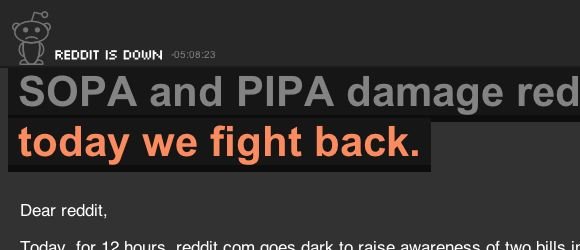Changing the Conversation on SOPA/PIPA
 Today, as everyone should know, is the day of the major protests (online and off) against the Stop Online Piracy Act and the Protect IP Act. Thousands of sites, including most prominently Wikipedia and Reddit, have blackened out their frontpage and, effectively, shut down for all or part of the day.
Today, as everyone should know, is the day of the major protests (online and off) against the Stop Online Piracy Act and the Protect IP Act. Thousands of sites, including most prominently Wikipedia and Reddit, have blackened out their frontpage and, effectively, shut down for all or part of the day.
The protests seem to be having an impact. Already two key Senators are dropping support of the bills and support for the bills, which once seemed destined for quick passage, has begun to waiver.
However, I voiced my personal opinions on SOPA and the debate around it last month. To recap, I’m not a SOPA/PIPA supporter and have several issues with the laws as written (though they are being rewritten now), however, the debate around it has fallen victim to buzzwords, over-simplification and hype, creating not only a strong opposition movement, but also an environment where engaged and fruitful discussion is impossible.
My fear in all of this wasn’t that SOPA would be defeated (as I said above and wish to repeat, I am NOT a SOPA supporter) but that the heated rhetoric would be used to attack copyright holders (large and small) who take other measures to protect their work.
Fortunately, that doesn’t seem to be happening, at least not on a large scale. To get such a large voice, many staunchly pro-copyright individuals and the vitriol has mostly been targeted at the acts themselves, not used to defend piracy or attack copyright as a larger issue. In fact, many strong SOPA opponents such as Google, which posted to its Public Policy blog, said that “Fighting online piracy is extremely important. We are investing a lot of time and money in that fight,” and other bloggers are pushing to “End Piracy, Not Liberty,” and “Stop piracy, not online freedom,“.
This in turn, gives me a great deal of hope that the conversation, once SOPA and PIPA are past (regardless of the outcomes) that the newly-aware public will be able to start thinking about these difficult issues in a less-polarizing way and, maybe, work together to come up with real solutions that everyone can live with.
With that in mind, I’m proposing 10 questions that the SOPA/PIPA debate raises in hopes, not so much of starting a dialogue here (though it would be nice) but more to get people thinking about the complexities of these issues and what can be done to respect both copyright (as well as other legal issues) and the Web.
10 Questions to Ponder
Note: Bear in mind that many of these questions don’t just apply to copyright law as other areas of law raise similar, equally difficult issues.
- Given that the Web is truly global, how can one nation enforce its laws effectively when illegal content or services are hosted in another nation, perhaps with different laws?
- Under what circumstances, if any, should access to a site be blocked on a significant (IE: National) level?
- If sites are to be blocked (for any reason), what checks and balances should there be to ensure that innocent sites are not targeted? Which authority should have final say on when action should be taken?
- If sites are to be blocked (for any reason), how should this be done and who should have the responsibility for blocking them? Should ISPs have the burden? Would DNS filtering (as with SOPA) be best or would another method, such as IP filtering, work better? Further, how do we ensure security of the Web while ensuring effectiveness of the block (if effectiveness is possible at all)?
- What other tools (either in addition to or instead of site blocking) should be used to deal with sites and services that knowingly and deliberately break the law of one country but exist physically in a jurisdiction that, for one reason or another, can not be breached?
- Specific to copyright, is a “Follow the money” approach more suitable for dealing with websites dedicated to piracy? Such as what is backed in the OPEN act, which was proposed by SOPA opponents as a compromise and is supported by Google.
- Regarding the “Follow the money” approach, would such a system be effective enough to justify the burden placed on payment processors and the risks of targeting innocent sites/companies?
- Given that most copyright holders are either small businesses or individuals with limited means. What tools can we provide them, if any, to help them deal with infringement on a global scale while ensuring a free and open Web?
- What changes, if any, are needed in the core of copyright law (term, rights granted, etc.) to help balance the rights of content creators with the unique environment that is the Web?
- Finally, what business models should content creators be seeking out to help them unlock the business potential of the Web while minimizing the impact of piracy and how can the law be used to support that? Do any changes need to be made?
Bottom Line
These are, without a doubt, big and difficult questions. Thinking about them and dealing with them involves more than just changing your avatar or blacking out your site. While protesting SOPA/PIPA is fine, doing so without answering the underlying questions it raises (and was designed, in part, to answer) simply opens the door for other, possibly worse, legislation down the road.
Once the blackout is done, perhaps we should use the Web as it was intended, as a means to discuss, share ideas and solve problems.
On that note, if I missed any questions, please leave a comment and I’ll add it to the post. I want this to be a forum for conversation on this topic, including all of the tough questions that, as of yet, have not been answered.
Want to Reuse or Republish this Content?
If you want to feature this article in your site, classroom or elsewhere, just let us know! We usually grant permission within 24 hours.
